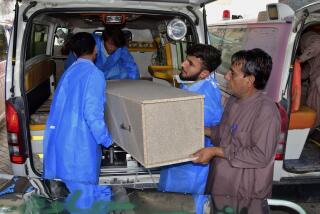Kidnaping Is Lucrative Trade in Karachi : A Wave of Kidnapings Proves Crime Can Be Most Lucrative in Karachi, Pakistan
- Share via
KARACHI, Pakistan — Kidnapers dragged Hasson Saleem, 11, from his school bus Oct. 10, forced him into a car and sped away. Hours later, abductors seized three more boys from affluent families of Sind province and a former chairman of the Pakistan National Shipping Corp.
Kidnapings for ransom are increasing in Karachi, and the belief grows that authorities are helpless against the lawlessness gripping Pakistan’s largest and most turbulent city.
In the rambunctious southern port where parties once ran until dawn, people are afraid to go out at night.
More than 100 people have been abducted in two years. No one has been killed, but more than 1 billion rupees ($500 million) in ransom has been paid.
The list of victims reads like a “Who’s Who” of industrial and financial families.
“We want a military government,” an executive of a multinational corporation said, echoing the sentiments of many residents. “We may not have law, but at least we’ll have order. In this democracy, we have neither law nor order.”
Benazir Bhutto’s political opponents blamed her for the violence in her home province until President Ghulam Ishaq Khan dismissed her 20-month-old government Aug. 6. It was one of the factors he cited in taking the action.
Gen. Mirza Aslam Beg, army chief of staff, then declared the crime wave over and said peace had been restored.
Kidnaping gangs soon proved him wrong, abducting people at the rate of one a day.
Businessmen held protest strikes that paralyzed Karachi, the country’s financial and industrial center, but nothing changed.
The gangs “have lists of top businessmen and their family members,” a security agent said, speaking on condition of anonymity. “Once they have selected their target, a reconnaissance team is deployed to gather the necessary information about their daily movement, and then they strike.”
Gang members then get in touch with the victim’s family, a deal is struck and the ransom paid.
Families seldom request official help because they lack faith in the police and fear for the victims’ safety.
“We can’t trust police because most of the crimes are committed with their connivance,” said a businessman whose younger brother was kidnaped.
Police say lack of cooperation by victims’ families and the public is a major reason for their failure to stop the kidnapers. They also claim that the gangs enjoy the patronage of some political parties.
Authorities accuse such extremist ethnic parties of involvement in many of the abductions. Students hostels in Karachi are said to be hide-outs for the gangs.
“Apart from political patronage, feudal patronage is also a factor,” the security expert said. “Most gangs enjoy the support of the big landlords who wield political influence. Because of these factors, the governments in Sind have almost become hostage to the criminals.”
Karachi’s economy has suffered. Businesses and investors are moving their operations from the financial and trading center of 9 million people to safer Punjab province in eastern Pakistan.
“I don’t know what will happen to me when I leave my home,” industrialist Tariq Shafi said. “I keep an automatic gun in my car. In this situation, how do you expect us to invest in the city?”
The flight of capital has boosted unemployment, already about 25%, and fed the “Kalashnikov and heroin culture,” a reference to the Soviet automatic rifles and heroin trade brought to Pakistan by the war in neighboring Afghanistan.
Companies that specialize in protection are thriving.
Two years ago, the Adamjee Insurance Co. started offering kidnap policies.
“Initially, we approached the leading businessmen . . . but now they are coming to us,” an Adamjee executive said, on condition his name not be used.
Adamjee works with Lloyd’s of London. When a client is kidnaped, experts from Britain are flown to help negotiate the ransom.
Businessmen are abandoning expensive luxury cars for less conspicuous compacts, hiring bodyguards and building huge steel gates to close off the streets around their fortified estates.
More to Read
Sign up for Essential California
The most important California stories and recommendations in your inbox every morning.
You may occasionally receive promotional content from the Los Angeles Times.











